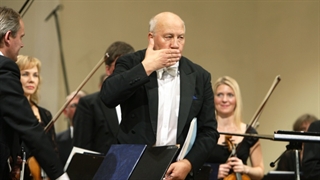Uncle Neeme and Boy Wonder Wow Nokia Hall

“World and Land,” Tallinn’s Nokia Concert Hall, June 30. Tengku Ahmad Irfan (piano), Arvo Leibur (violin), Estonian National Male Choir, Estonian National Symphony Orchestra conducted by Neeme Järvi.
Strolling through Tallinn Thursday night on the way to Nokia Concert Hall, it seemed almost a sin to duck into a dark auditorium for a program of music. The city was abuzz, everyone was out in their shorts eating ice cream or drinking something cold; it was a perfect warm summer evening. But those who eschewed the corporeal pleasures of cool refreshments and warm air were rewarded with the ethereal joys of two and a half hours of beautifully crafted sounds.
In fact it was a memorable evening for a number of reasons. Legendary conductor Neeme Järvi was back doing what he clearly loves and what Estonian music fans want: conducting the Estonian National Symphony Orchestra. The elder statesman of Estonian music shared the stage with a wunderkind from Malaysia, Tengku Ahmad Irfan, who could well be performing for another seventy years. There was choral music, some virtuoso violin and explosives for the Tchaikovsky finale.
A strong current of Estonian composition ran through the program. The famous Kapp musical family got things going, first with Villem Kapp’s vigorous choral work “Northern Coast”, performed by the Estonian National Male Choir. Next, Eugen Kapp’s Suite from the ballet “Kalevipoeg” (1947) was conjuring up visions of rural Estonia and epic myth with hints of Aaron Copeland thrown in.
But much of the reason for the sold out crowd followed with the performance of Chopin’s Piano Concerto No.1 in E minor Opus 11 by the 13 year old Tengku. During the long introduction, he fidgeted expectantly in his seat, and seemed to be making sure his feet could reach the pedals. He’s a little fellow even for a 13-year-old. But he played wonderfully; the sublime passages of Chopin flowed melodiously and with apparent ease. The audience was enthusiastically receptive. When the piece was over he ran to Uncle Neeme and got a big hug and an ovation. Afterward, Tengku played an encore of Beethoven piano work. Then more ovations and bouquets. Järvi acted as cheerleader, egging the crowd to rhythmic clapping.
Tengku was a tough act to follow, but violin soloist Arvo Leibur managed. It was another Estonian, Eduard Tubin’s “Suite on Estonian Dance Tunes for Violin and Orchestra”, that allowed Leibur to shine as featured artist. Tubin, who spent much of his life in exile after the Soviet occupation, was a student of Estonian folk music, especially that of Saaremaa, and this rustic quality permeates the piece.
After an evening that was so filled with homage to Estonia, it was an interesting choice to finish with that most nationalist of Russian pieces, Tchaikovsky’s “1812 Overture”, but its celebratory quality suited the event. And the raucous piece really got the audience going. Järvi was literally dancing a jig while conducting. By the time the last cannon shot rang out, President Toomas Hendrik Ilves had a warm handshake and some intimate words for Järvi. The maestro was back in form.